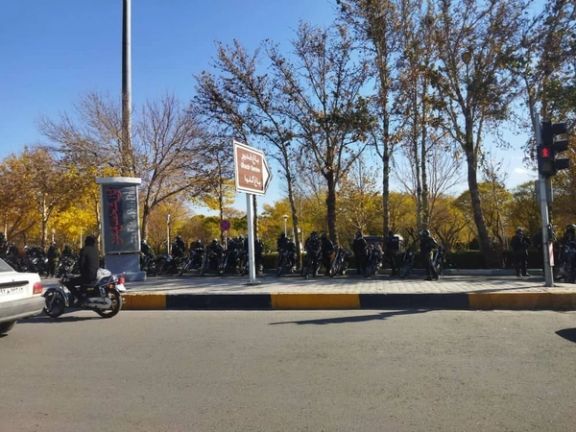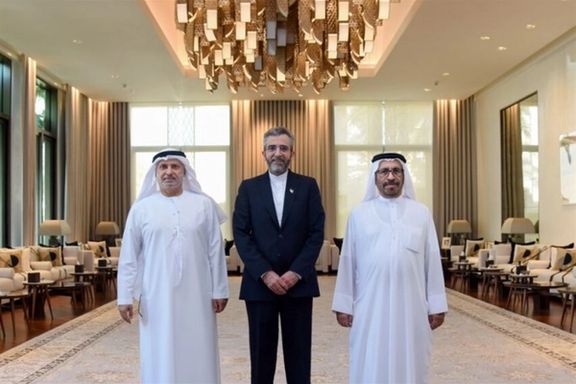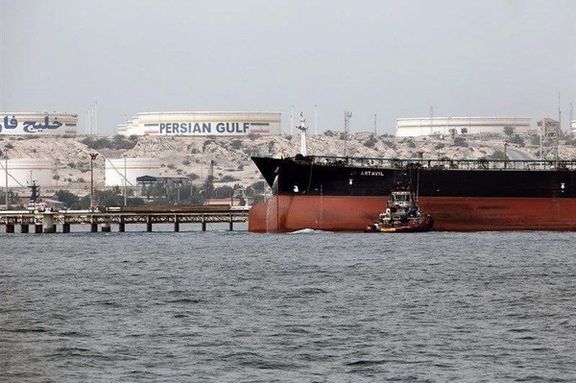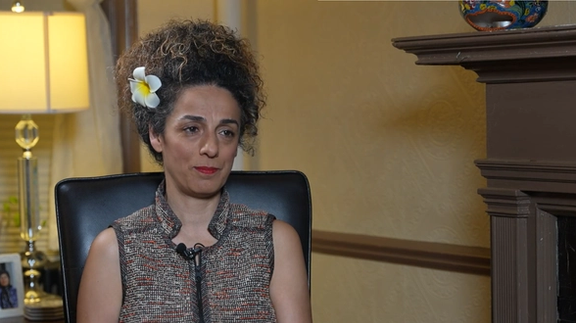Budget Chief Says Iran Will Aim For 8% Growth Despite Sanctions

Iran’s budget planning chief has said that the country will not tie the future of its economy to nuclear talks and will aim for 8 percent growth next year.

Iran’s budget planning chief has said that the country will not tie the future of its economy to nuclear talks and will aim for 8 percent growth next year.
Massoud Mirkazemi, the head of the Planning and Budget Organization, in tweets on Friday confirmed the news, while some economists told media in Iran they have serious doubt about achieving any growth under US sanctions.
Iran’s economic growth has been zero for the past 15 years, as international and US sanctions interrupted its oil exports and global banking relations. Although there were years when there was a positive rate of growth, overall the economy has stalled.
Mirkazemi claimed that non-oil exports increased by 40 percent since the beginning of the Iranian year in March.
Iran’s steel production fell by 15 percent in October, following smaller declines earlier in the year resulting from lack of electricity.
Iran’s method for generating revenues has been a relentless increase in liquidity, which has led to a 50-percent inflation rate and a ninefold drop in the value of the currency.

Authorities blocked access Friday to the dry riverbed in Esfahan, where those who protested the previous Friday planned to congregate at noon for prayers.
According to postings on social media, police and security forces including Basij militia deployed around the city's landmark Khajoo Bridge, the center of last Friday's protests, and in nearby areas.
Security forces also set up checkpoints in the city. Two videos acquired by Iran International show a roadblock, and dozens of riot police and other security forces maneuvering on motorcycles.
The large-scale police operation on Friday amounted to an undeclared martial law in the city.
The few people managing to tweet from Esfahan Friday said mobile internet was disrupted and that wi-fi connections were too slow for their photos and videos. Some also reported disruption to mobile phone connections.
Mohammad-Reza Mohammadi, chief of Esfahan traffic police, announced Thursday that roads along the river and leading to the bridge would be closed to cars, motorcycles and pedestrians from 5am Friday, and parked vehicles would be clamped and removed.
An anonymous call was widely circulated on social media in recent days called for people to gather for Friday prayers in the dry bed of Zayandeh Roud. Germany-based journalist Mehdi Mahdavi-Azad told Iran International this was a “very clever move” to draw people away from the usual Friday prayers led by “state-appointed imams.”
While security forces prevented people from reaching the river bed, Mojtaba Mirdamadi, the Friday prayer imam of Esfahan, said previous administrations had ignored the plight of farmers facing water shortages and that the issue lay now “in God's hands." Mirdamadi in previous times criticized the government of former president Hassan Rouhani for alleged mismanagement of water resources.
"We hope rain sent by God will solve all the problems," Mirdamadi told his congregation and advised them to hold special prayers for rainfall.
In Mashhad in north-eastern Iran, Friday prayer leader Ahmad Alamolhoda told those congregated that that among last week's protesters had been "mercenaries of the enemy" who had used Molotov cocktails. He said the people of Esfahan would not “oppose the Revolution for the sake of food and water.”
Authorities and state media in the past few days called the call for Friday’s rally politically motivated and suggested "rioters" were trying to take advantage of water protests.
Esfahan’s governor, Mohammad-Ali Ahmadi, said in a radio program Thursday that no one had applied for a permit to protest. He argued that that the authorities had heard farmers' voices and that farmers had realized "anti-revolutionary groups" were looking to manipulate any protests. "Security forces will prosecute those who spread rumors and fake news on social media," he warned.
The Islamic Republic routinely ignores applications requesting permit for political gatherings and only issues permission for rallies organized by the government. When a group congregates for a protest, they are usually dispersed or arrested.
Esfahan farmers' union in a statement Wednesday said it was not planning further protests Friday. Many on social media have alleged they had been coerced by security forces.
The justice department of Esfahan province said that in a statement Thursday that farmers no longer intended to protest, so that protests on Friday would be unjustified, illegal, and aimed at "abetting and aiding the enemies of the Islamic Republic.”

Prices for essential food items jumped more than 60 percent in Iran in October compared with the same period last year, showing a relentless pace in inflation.
The highest price increase was related to sugar, which jumped by 76 percent compared to October 2020 as the government stopped allocating cheap dollars for its import. The data was released this week by the Ministry of Industry, Mines and Trade.
Since April 2018, Iran has been providing US dollars to importers of essential goods at the preferential rate of 42,000 rials, while the dollar has steadily climbed against Iran’s rial, reaching 290,000 in November.
This was in fact a food subsidy first provided when looming US economic sanctions in early 2018 were already creating high inflation in the country.
The cash-strapped government has been winding down the preferential dollar rate, which could push the current 50-percent inflation rate even higher. This indirect subsidy has cost the government at least $8 billion a year, roughly equal to its oil income in the same period.
Sugar is a vivid example as an essential food staple, with the price expected to rise even higher as stockpiles of subsidized imports decline and importers have to buy dollars at much higher rates.
Rice, which is a central staple of Iranian diet rose by more than 60 percent compared to last year. Imported rice had a smaller price increase, because of the indirect government subsidy, which could run out in the near future.
The reason for the steep price increase of domestic rice could be partly attributed to worsening drought this year, but production cost including fertilizer, and overall inflation also play a role.
Price of chicken meat increased by 42 percent, reaching $1.30 per kilogram. This is a good price compared with other countries, but the falling incomes of Iranians should be considered. A blue-collar worker earns around $100 a month and an office worker $150. If the worker has to feed a family of three, buying poultry becomes difficult and buying red meat at $4-5 becomes a luxury.
Reports say that meet consumption has fallen by around 40% this year as the price rose an average of 60 percent.
An even more alarming inflation news pertains to price increases in just one month, from September to October. Food prices rose between 1.9 to 8.4 percent on month-to-month basis, a sign of more trouble down the road.
Iran has experienced rounds of protests since December 2017, all triggered by high inflation. But every protest quickly turned into anti-government and anti-regime unrest. Economic hardship leads to demonstrations, but protesters have other deep grievances, such as religious restrictions on lifestyle, government corruption, nepotism and pessimism about the future that quickly manifest themselves.

Iran and the United Arab Emirates appear to be taking the first steps toward some sort of rapprochement after years of tense relations and Iranian threats.
During a visit to the United Arab Emirates on November 24, only a few days before leaving for Vienna for nuclear negotiations with world powers, Iran's Deputy Foreign Minister Ali Bagheri Kani pledged on behalf of the Islamic Republic to begin a new chapter in relations with the UAE, Bloomberg reported.
On the same day, Bagheri described the meeting in Dubai with UAE Presidential Adviser Anwar Gargash as “friendly and cordial.”
Three days before Bagheri's visit, Iran and UAE foreign ministers had welcomed the improvement of ties during a telephone conversation. Meanwhile, the Iranian Foreign Minister Hossein Amir-Abdollahian said that Tehran attaches special importance to its ties with the UAE, particularly in the area of trade.
Iran has been using Dubai as a key outlet to international markets often referring to it as a one-stop-shop that could provide goods to Iran from a variety of Asian and other countries. Many Iranian merchants maintain offices in Dubai where they have residence and business permits. Many other Iranians own real estate in Dubai and foreign-based satellite televisions constantly advertise properties in the UAE Iranians can buy with little or no legal restrictions.

Reports coming from the UAE by the end of November indicated that the United Arab Emirates would soon send a delegation to Iran as part of efforts to improve ties with rival Tehran. Gargash told reporters that the UAE will keep its Arab neighbors and allies including the Saudis "in the picture" about the developments in bilateral ties with Iran.
Some observers believe that attempts toward a rapprochement with Iran are motivated by the general perception in the region, following US withdrawal from Afghanistan, that Washington has shifted its attention from the Middle East to East Asia, and players in the region may no longer be counting on the US to protect them against Iran's ambitions.
Noor News, a website close to the Iranian Supreme Council of National Security, has opined, that Iranian officials would welcome the upcoming visit by a high-ranking UAE delegation, which could be a positive step to reduce tensions. Meanwhile, the website said it is significant that the UAE has started this move while Iran is holding talks in Vienna. The gesture by the UAE would mean that Iran is not an isolated state.
Furthermore, UAE businesses may be showing their willingness to win the lion's share of Iran's foreign trade once US sanctions on Iran's international commerce and banking are lifted if the talks in Vienna prove successful.
Monday November 29 was the 50th anniversary of Iran capturing the three islands of Abu Musa, and the Lesser and Greater Tunb Islands in the Persian Gulf. While many Iranian media reports and social media accounts were cheerful about the anniversary, Turkey's national TV, TRT, on its Arabic Twitter account described the Islands as UAE islands occupied by Iran. This has annoyed Iranians as the dispute over the ownership of the three islands once again found its way into media. Iran at various points provided documents that indicate the islands were rented out to Arabs during the British colonial period.
Although the UAE has made no new claim about the islands, some Iranian media outlets and social media accounts have been talking about a Turkish conspiracy to damage the rapprochement that has been taking shape over the past weeks between Tehran and Abu Dhabi.

A cargo of Iranian condensate intended for Venezuela, the fourth delivery this year, will discharge in coming days at the country's main oil port, a Venezuelan lawmaker said on Thursday.
Iran last year began providing the Venezuelan state-run oil company PDVSA with condensate that is used to make the South American nation's extra heavy oil exportable. This year, PDVSA and the National Iranian Oil Company (NIOC) signed a swap deal that formalized the exchange of Venezuelan crude for Iranian condensate.
The swaps, occurring amid US sanctions on both nations and their oil industries, have allowed PDVSA to ramp up crude output this autumn to levels close to those of early 2020.
"Two million barrels of diluent have just arrived. Where? - from Iran," said Angel Rodriguez, a lawmaker from President Nicolas Maduro's socialist party.
Washington imposed trade sanctions on PDVSA and its subsidiaries in 2019 as a way to oust Maduro after it called his re-election a sham. The measures barred exports to the United States, which used to buy most of Venezuela's crude.
PDVSA has adapted to the measures by finding new customers and ways to ship its crude and refined products to countries including China.
Iran has delivered some 4.8 million barrels of condensate to PDVSA and its joint ventures this year and has also supplied it with gasoline. It has received in return at least 5.8 million barrels of Venezuela's Merey 16 heavy crude and jet fuel.
Report by Reuters

Masih Alinejad, an Iranian activist says that she would join two US Senators introducing a law named after her, aimed at Iran’s “transnational terror campaign.”
No details of the legislation proposed by Democrat Ben Cardin and Republican Pat Toomey have been published. It may propose additional sanctions against Iran just as diplomats in Vienna are working to revive the 2015 agreement limiting Iran’s nuclear program.
Alinejad, a best-selling author based in New York, was reportedly the target of an Iranian plot to kidnap her and take her to Iran via speedboat to Venezuela. A vocal supporter of strong US measures against the Islamic Republic, Alinejad has accused the Biden administration of ignoring human rights violations by Iran for the sake of reviving the 2015 nuclear deal, the JCPOA (Joint Comprehensive Plan of Action) nuclear program.
Alinejad was contacted by US Secretary of StateAntony Blinken after an interview with CNN in July in which she requested a meeting with President Joe Biden. In 2019 Alinejad had a well-publicized meeting with President Donald Trump’s Secretary of State Mike Pompeo.
Blinken said that the US would “support the indispensable work of independent journalists around the world,” and would not “tolerate efforts to intimidate them to silence their voices.”
Alinejad tweeted a readout of the call saying Blinken had found the idea that Tehran would abduct her from the US “particularly egregious.” She added Blinken had assured her the Biden administration would hold Iran accountable for the alleged plot.
The US Justice Department announced July 13 that four Iranian nationals were indicted on charges of conspiracies related to kidnapping, sanctions violations, bank and wire fraud, and money laundering, and a co-conspirator was facing additional structuring charges. One of the Iranians awaits trial in the US.
Although the Justice Department statement stressed that an indictment did not establish guilt and specifically avoided names, Alinejad announced she had been targeted for abduction along with other journalists from Canada and the United Kingdom and the Federal Bureau of Investigation (FBI) had protected and monitored her home for months.
Dozens of Iranian journalists in other countries, including those working for BBC Persian TV and London-based Iran International TV, repeatedly complain about their own and their family members' harassment in Iran, and say they had been warnedby authorities about possible actions.
Iran executed in December 2020 Rouhollah Zam, editor of a social-media channel, after he was kidnapped in Iraq and convicted on security charges and televised confessions, without due process of law.